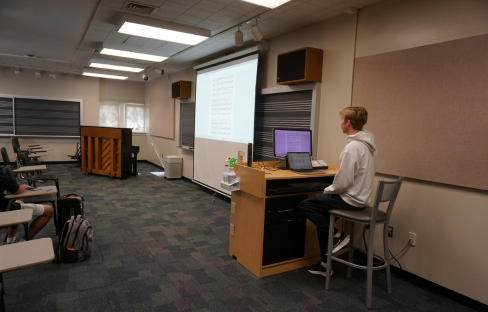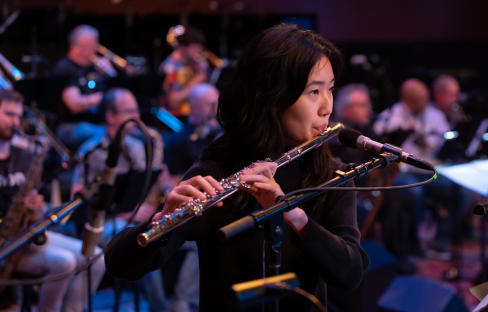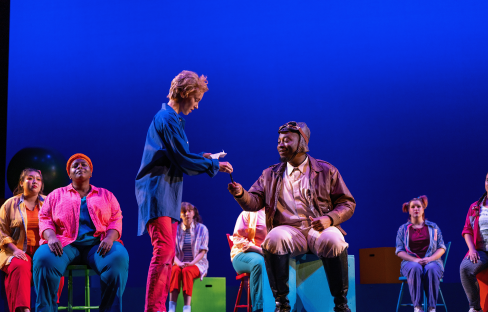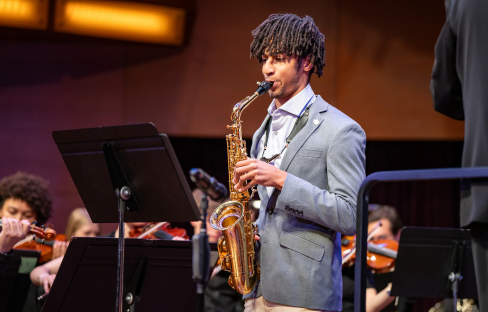Composition

The composition program stresses the technical aspects of form, harmony, counterpoint and orchestration, but also puts strong emphasis on the development of personal creative style. Students study individually with composition faculty members and are also given the opportunity to work in the MIDI laboratory. This facility includes current MIDI equipment and computer applications.
Importance is placed on hearing and performing compositions. Student compositions are performed throughout the year in recitals, and each spring a concert is held featuring the most outstanding works of each student. Each year, the university hosts a Contemporary Music Festival, which brings recognized composers and performers to our campus.
Jazz Studies

JMU offers both an undergraduate Concentration in Jazz Studies (a "jazz studies major") and a Minor in Jazz Studies. Performing groups include two large jazz ensembles and multiple jazz chamber ensembles. The JMU Jazz Ensemble has a long tradition of excellence and has performed at the Montreux, North Sea, and East Coast Jazz Festivals, VMEA convention, and at the Kennedy Center's Terrace Theater. The small groups, coordinated by Chuck Dotas, are student organized (coached weekly by a faculty member) and participate in a regular gig at Clementine Cafe. JMU also offers an intensive summer jazz study abroad session in Montreal, Quebec for four weeks each summer.
Music Education
The music education program consists of both instrumental and vocal concentrations. Students who choose a vocal concentration participate in applied study in either voice or keyboard and focus on the pedagogical aspects of teaching general and/or vocal music. Those who choose an instrumental concentration participate in applied study on their individual instrument and focus on the pedagogical aspects of teaching instrumental music. Both concentrations provide certification to teach kindergarten through 12th-grade music upon completion of the program.
Music Industry
The music industry program offers a broad course of study suiting the needs of a diverse profession. With two undergraduate degrees—a Bachelor of Music with an emphasis in Music Industry & a Bachelor of Arts in Music with a concentration in Music Industry—music industry graduates are creative managers and/or entrepreneurs whose most striking asset is versatility. Students must take a core of music industry, business and music courses. These courses will serve as a foundation for career growth and management. Program graduates may expect to enter a job market that requires flexibility to think beyond the limitations of narrow vocational study.
Please take note that all Bachelor of Music applicants must audition on a primary instrument or voice part. This includes music industry.
Performance
The music performance program offers a broad course of study tailored to meet the needs of the individual musician and prepare the student for further pursuit in the many areas of the music profession. Music performance graduates complete their studies with necessary creative-thinking skills that will allow them to adapt in the changing world of music performance.
More about our performance concentrations:
- Instrumental - Brass, Strings, Percussion, Woodwinds
- Piano/Piano, Emphasis in Accompanying
- Voice
Music Studies

The music studies concentration leverages the benefits of JMU's strong liberal arts foundation by combining rigorous core study in music with the opportunity to pursue outside interests, including double majors. Students in this program build a musical foundation through ensemble participation, music history, music theory, and music electives, with the option to audition for applied lessons if they wish. At the end of the program, students work one-on-one with a chosen faculty mentor to complete a capstone project that unites their passions.
Music Theatre

The music theatre program is designed to prepare the vocal music student to be competitive in the field of popular Broadway musical theater performance. Courses build on the standard music core classes with selected performance-related classes from both the School of Music and the School of Theatre and Dance. This highly selective program is focused on the creation of skilled artists with strengths in the three demand areas of singing/musicianship, acting for the stage and movement/dance. Upon graduation, students are prepared to audition for entry-level positions in the musical theater and entertainment industry.
Graduate Degree Programs
Master of Music (M.M.)

The School of Music offers a Master of Music degree program that provides students with the necessary opportunities to achieve the highest degree of musical development and professional training.
Students graduating from the M.M. program (with concentrations in Composition, Conducting, Music Education, and Performance) will be able to:
Composition:
- formulate a personal creative style of composition.
- demonstrate the fundamental concepts of form, harmony, counterpoint and orchestration.
- differentiate and apply the techniques and aesthetics of musical creation.
- apply the core principles of effective research as scholars and composers.
Conducting:
- demonstrate application of physical conducting skills and rehearsal techniques through the performance of advanced repertoire in the student’s area of specialization.
- formulate advanced insights into the artistic and formal structure of music through score study in the student’s area of specialization.
- describe the musical and formal elements of the major literature in the student’s area of specialization (vocal/choral or instrumental).
- apply the core principles of effective research as scholars and conductors.
Music Education:
- communicate effectively both verbally and in writing.
- articulate, critique, and synthesize the foundations and principles of music education.
- demonstrate advanced methodologies in the student's area of specialization.
- apply the core principles of effective research as scholars and practitioners.
Music Performance:
- demonstrate application of musical and technical mastery in the student’s area of specialization (instrumental or voice).
- identify and describe the standard solo, chamber, and ensemble repertoire in the student’s area of specialization.
- apply the core principles of effective research as scholars and performers.”
Doctor of Musical Arts (D.M.A.)

The Doctor of Musical Arts (D.M.A.) degree program is the most advanced course of study offered in the School of Music at James Madison University. The program has been designed to make graduates more marketable in higher education by emphasizing pedagogy and literature along with advanced performance or conducting skills.
Students graduating from the D.M.A. program (with Concentrations in Performance and Conducting) will be able to:
Performance, Instrumental or Voice:
- Demonstrate application of musical and technical mastery through the performance of advanced repertoire in the student’s area of specialization.
- Create and deliver effective pedagogical instruction.
- Analyze the standard solo, chamber and ensemble repertoire in the student’s area of specialization.
- Communicate effectively about music through a) writing and b) speaking.
Performance and Conducting:
- Demonstrate application of musical and physical conducting skills through the performance of advanced repertoire in the student’s area of specialization (instrumental or vocal).
- Demonstrate effective rehearsal techniques through the preparation of representative repertoire in the student’s area of specialization (instrumental or vocal).
- Create and deliver effective pedagogical instruction.
- Formulate advanced insights into the artistic and formal structure of music through score study in the student’s area of specialization.
- Communicate effectively about music through a) writing and b) speaking.




